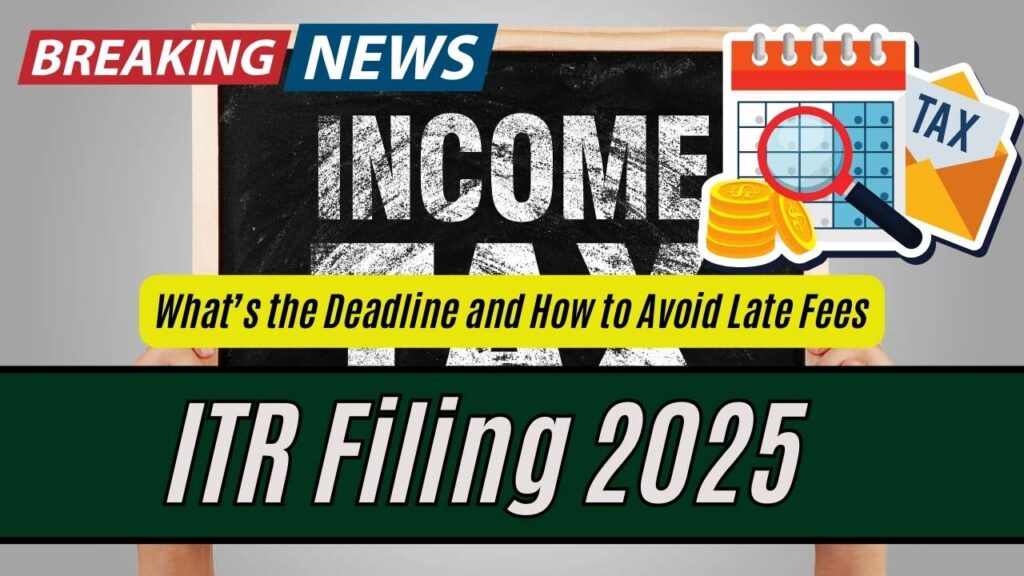ITR Filing 2025 – Filing your Income Tax Return (ITR) for FY 2024-25 is not just a legal obligation but a vital step toward maintaining your financial health. Whether you’re a salaried employee, a freelancer, or a small business owner, being aware of the ITR filing deadline for 2025 and the consequences of late filing can save you from unnecessary stress, penalties, and missed opportunities.

In this guide, we’ll break down everything you need to know—from due dates and penalties to step-by-step instructions and insider tips—so you can file your return on time and avoid late fees.
ITR Filing 2025
| Particulars | Details |
|---|---|
| Financial Year | 2024–25 |
| Assessment Year | 2025–26 |
| ITR Filing Due Date | July 31, 2025 |
| Belated Return Last Date | December 31, 2025 |
| Late Fee (Section 234F) | ₹1,000 (income ≤ ₹5 lakh); ₹5,000 (income > ₹5 lakh) |
| Interest on Tax Due (234A) | 1% per month on pending tax after due date |
| Who Should File? | Salaried employees, freelancers, business owners, NRIs, pensioners |
| Official Website | https://www.incometax.gov.in |
Filing your ITR for FY 2024–25 before July 31, 2025, is more than just a legal requirement—it’s a smart financial habit that opens doors to refunds, deductions, and smoother financial planning. With the rising complexity in digital transactions, stock investments, and new-age earnings, staying compliant and timely is the best way to avoid late fees and maintain a strong financial profile.
Why Is ITR Filing So Important in 2025?
Every year, the Income Tax Department of India sets a deadline for individuals to file their returns for the previous financial year. For FY 2024-25 (AY 2025-26), that date is July 31, 2025 for most individuals and HUFs whose accounts don’t require auditing.
Filing on time:
- Prevents late fees and interest charges.
- Helps claim timely income tax refunds.
- Allows loss carry-forward (such as capital or business losses).
- Builds a credible financial profile for loans, visas, and investments.
Missing the deadline may seem like a small delay, but it can come with significant costs—both financial and legal.
Who Needs to File ITR in 2025?
You must file an ITR if:
- Your gross annual income exceeds ₹2.5 lakh (₹3 lakh for seniors and ₹5 lakh for super seniors).
- You’ve made investments or had income from stocks, mutual funds, or crypto.
- You want to claim a refund for excess TDS deducted.
- You’re applying for a loan, visa, or credit card that requires ITR proofs.
- You’re an NRI earning taxable income in India.
Even if your income is below the threshold, filing can be beneficial in building financial credibility.
Understanding the ITR Filing Deadline 2025
Regular ITR Filing Deadline
The standard due date to file ITR for FY 2024–25 is July 31, 2025. This applies to individuals, salaried taxpayers, and freelancers not subject to audit.
Belated Return Deadline
Missed the regular deadline? You can file a belated return under Section 139(4) by December 31, 2025, with applicable late fees.
Revised Return Deadline
Made a mistake? You can revise your ITR by December 31, 2025 under Section 139(5). But make sure the original return was filed on or before the deadline.
Updated Return Option (Section 139(8A))
From FY 2022-23 onwards, taxpayers also have the option to file an Updated Return within 24 months from the end of the relevant assessment year, subject to additional taxes. This option can be used if you miss both the original and belated deadlines.
Consequences of Missing the Deadline
Failing to file your return on time can trigger multiple penalties and restrictions:
Late Filing Fee (Section 234F)
- ₹1,000 if your income is below ₹5 lakh.
- ₹5,000 if your income is above ₹5 lakh.
Interest on Outstanding Tax (Section 234A)
If you have tax payable and miss the deadline, interest of 1% per month will be charged from the due date till the date of filing.
Loss of Deductions and Carry Forward
- Deductions under Sections 80C, 80D, 80G etc., may be disallowed.
- Business or capital losses can’t be carried forward if ITR is filed late.
Prosecution and Penalties
Persistent non-filing or willful evasion can lead to prosecution, fines, and even imprisonment under Section 276CC.
Guide to File Your ITR for AY 2025–26
Here’s how you can file your ITR quickly and correctly:
Step 1: Gather Necessary Documents
- PAN, Aadhaar card
- Form 16 (for salaried)
- Form 26AS (tax credit)
- Annual Information Statement (AIS) and Taxpayer Information Summary (TIS)
- Interest certificates from banks
- Investment proofs (ELSS, PPF, LIC)
- Capital gains statements
Step 2: Visit the e-Filing Portal
Go to the official income tax portal: https://www.incometax.gov.in
Step 3: Log In and Choose ‘File Income Tax Return’
Use your PAN as the user ID. Select the assessment year as 2025–26, choose online or offline filing, and select the applicable ITR form (ITR-1, ITR-2, etc.).
Step 4: Fill in the Details
- Enter income from all sources.
- Claim deductions under the appropriate sections.
- Cross-check TDS with Form 26AS, AIS, and TIS.
Step 5: Verify Your Return
Use options like Aadhaar OTP, net banking, or bank account-based EVC to e-verify your return instantly.
Step 6: Keep the Acknowledgement
Once filed and verified, download ITR-V (acknowledgement) for your records.
Smart Tips to Avoid Late Fees in 2025
- Set calendar reminders for July 31 and December 31.
- Use trusted ITR platforms like ClearTax, TaxBuddy, or IndiaFilings.
- Consult a tax expert if you have complex income sources or foreign investments.
- Link your PAN and Aadhaar to avoid filing errors.
- File early to beat last-minute portal slowdowns and avoid errors.
FAQs about ITR Filing 2025
Q1. What happens if I file ITR after July 31, 2025?
You will have to pay a late filing fee of up to ₹5,000 and may also lose out on deductions or the ability to carry forward certain losses.
Q2. Can I file ITR if my income is below ₹2.5 lakh?
Yes, and it is often recommended if you want to claim TDS refunds or maintain a good financial track record.
Q3. What is the last date to revise my ITR?
You can revise your return anytime before December 31, 2025, provided you filed the original return on time.
Q4. What if I miss even the belated return deadline?
You will not be able to file your ITR for that year. You may also face penalties and inability to claim refunds or carry forward losses.
Q5. Can salaried individuals use ITR-1 in 2025?
Yes, if they have income from salary, one house property, and other sources (like interest) up to ₹50 lakh, they can use ITR-1 (Sahaj).
Q6. What is an Updated Return and who can file it?
An Updated Return under Section 139(8A) allows taxpayers to file a return up to 24 months after the end of the relevant assessment year, subject to paying additional taxes. It can be filed even if you missed earlier deadlines.









